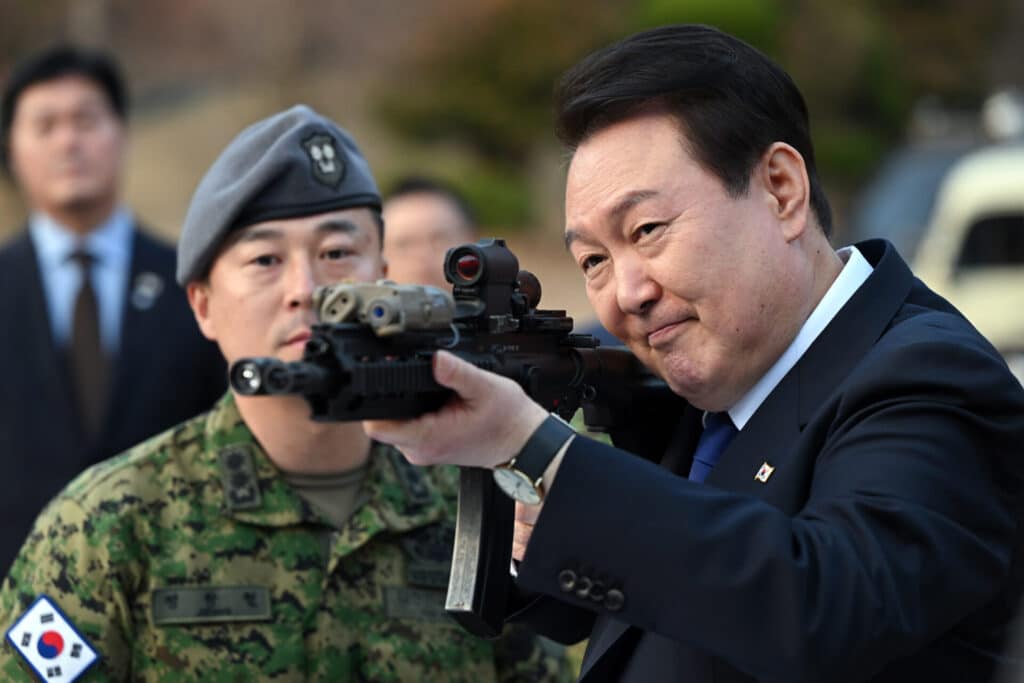


In a surprise late-night TV address, South Korean President Yoon Suk Yeol declared martial law and accused the country's opposition of controlling parliament, showing sympathy towards North Korea, and obstructing the government with anti-state activities. As photos and videos of tanks rolling into Seoul and troops securing the parliament surface, questions arise about the extent of the measures and their impact on democracy. President Yoon's popularity has declined in recent months as he struggles to push his agenda against an opposition-controlled parliament since taking office in 2022.
South Korea's Surprising Declaration of Martial Law: A Deep Dive
In a stunning turn of events, South Korean President Yoon Suk Yeol declared martial law late at night in a televised address. Accusing the opposition of undermining the government and harboring pro-North Korea sympathies, he initiated a military takeover that has raised concerns about the future of democracy in the country.
Background:
South Korea has a history of authoritarian rule, with military dictatorships dominating the political landscape from the 1960s to the 1980s. The country's democratic transition in the 1990s brought about a period of relative stability and economic growth. However, recent years have seen a resurgence of political polarization and a decline in public trust in elected officials.
President Yoon, a conservative who took office in 2022, has faced criticism for his handling of various issues, including his approach to North Korea and his attempt to relocate the presidential office. His approval ratings have plummeted, giving the opposition-controlled parliament significant leverage.
Declaration of Martial Law:
In his televised address, President Yoon accused the opposition of obstructing government initiatives, sympathizing with North Korea, and engaging in anti-state activities. He declared martial law, citing the need to restore order and protect national security.
The declaration was met with shock and disbelief. Photos and videos emerged online showing tanks rolling into Seoul and troops securing the parliament building. The extent of the military takeover and its impact on civil liberties remain unclear.
Impact on Democracy:
The declaration of martial law raises serious concerns about the future of democracy in South Korea. The military has a long history of intervening in politics, and its increased presence could undermine democratic institutions.
The opposition parties have condemned the declaration as an authoritarian power grab and have vowed to resist it. However, their ability to do so is limited, given the military's control over the government.
Top 5 FAQs:
1. What does the declaration of martial law entail?
The declaration of martial law gives the military sweeping powers to control the country. This includes the ability to detain citizens, impose curfews, and censor the media.
2. What is the basis for the declaration?
President Yoon claims that the opposition's actions pose a threat to national security and that martial law is necessary to restore order. However, critics argue that the declaration is politically motivated and that the opposition's actions do not justify such drastic measures.
3. What impact will martial law have on civil liberties?
The declaration of martial law will likely result in restrictions on civil liberties, including freedom of speech, assembly, and movement. The military may also have the power to arrest and detain people without due process.
4. What is the role of the opposition?
The opposition parties have condemned the declaration of martial law and have vowed to resist it. However, their ability to do so is limited, given the military's control over the government.
5. What does the future hold for South Korea?
The declaration of martial law has plunged South Korea into political uncertainty. The fate of democracy in the country remains unclear, and the outcome of the current crisis is uncertain.

As the Bihar Assembly elections approach, PM Modi raises the stakes with his public rally in Arrah criticizing the Mahagathbandhan manifesto for its false promises. He asserts that the NDA's honest declaration will bring industrial development and job opportunities for the youth in Bihar. PM Modi is confident that the NDA will achieve victory with a record margin, while the leaders of the Mahagathbandhan will face a crushing defeat.

Congress MP Rahul Gandhi will address the media in New Delhi today, with speculations that he will reveal more details about alleged irregularities in voter lists. This comes after his previous claim of a "hydrogen bomb" being related to his accusations of "vote theft." Gandhi had earlier alleged a centralised software was used to delete names from voter lists in multiple states. The press conference is scheduled for 12 pm at the AICC headquarters.

Zohran Mamdani has won the New York City mayoral election, becoming the city's first Muslim mayor. In his victory speech, Mamdani promises to bring light to the city and outlines his plans, including taxing millionaires to fund social programs. Meanwhile, Democrats have also swept governor races in Virginia and New Jersey in a significant victory for the party. These elections are seen as a rebuke to President Trump, who had threatened to cut federal funding to NYC if Mamdani won.

Union Minister Amit Shah addressed the inauguration of the expanded capacity of Dr Vitthalrao Vikhe Patil Cooperative Sugar Factory in Maharashtra's Ahilyanagar. He thanked the MLAs of the National Democratic Alliance for donating one month's salary to the relief fund for the affected farmers. Shah also praised the Maharashtra government for their initiatives and highlighted the renaming of districts under the BJP-Sena government.

The Pasighat police in East Siang district, Arunachal Pradesh have arrested the 33-year-old boys' hostel warden of Sanggo English School for sexually assaulting minor students. This came to light when a student was hospitalized for urogenital complications. The incident has sparked outrage from parents and the public, demanding strict action against the accused warden. In response, the Arunachal Pradesh State Human Rights Commission (APSHRC) has taken suo motu cognisance and ordered for a detailed report on the investigation, victim protection, and school management.

Actress Siddiqa Begum, daughter and legal heir of Shah Bano, has served a legal notice on the makers of the upcoming Bollywood film 'Haq'. The notice states that the film's unauthorized depiction of the personal life of Shah Bano without the consent of her legal heirs is a violation of their rights. 'Haq' is based on the landmark 1985 Supreme Court case that granted maintenance to Shah Bano, a Muslim woman, from her divorced husband.

After four years, the 'Darbar Move' tradition in Jammu and Kashmir has been restored, fulfilling the promise of the government and bringing a boost to the economy. National Conference chief Farooq Abdullah expressed happiness, noting that those who sought to separate Jammu and Srinagar have failed. Chief Minister Omar Abdullah received a warm reception and inspected the secretariat premises after the ceremony, as security in the region was heightened for the occasion.

Delhi Legislative Assembly Speaker Vijender Gupta praised Swami Dayanand Saraswati as not just a saint and reformer, but also a pivotal figure in India's freedom struggle. Speaking at the International Arya Samaj Conference, Gupta highlighted how Swami Dayanand's teachings sparked a revolution that led to the nation's independence. The event was attended by esteemed guests including Gujarat Governor Acharya Devvrat and top officials from the Arya Samaj community, all paying tribute to the enduring impact and legacy of Swami Dayanand Saraswati.

The Metro Railway Kolkata has announced a major schedule expansion for its Yellow Line, which runs between Noapara and Jai Hind Bimanbandar (Airport) in Kolkata. Starting from 3 November, weekday operations will increase to 120 services with extended operating hours, providing greater convenience and accessibility to commuters. Weekend travellers will also see a significant frequency upgrade, making travel on Saturdays and Sundays hassle-free. This move is expected to improve the overall public transportation system in the city and benefit the commuters.

Despite some reassurances that online verticals focused on diversity will continue, NBC News has announced a round of layoffs that will impact about 150 employees, or 2% of their workforce. The cuts are said to be a result of cost-cutting measures in preparation for the split of Comcast's cable networks into Versant. This move signifies a shift in priorities for NBC management, prioritizing corporate profits over hard-working members, according to Susan DeCarava, president of The NewsGuild of New York. This change also means that MSNBC will no longer lean on NBC News for newsgathering, with those ties expected to be severed next week.